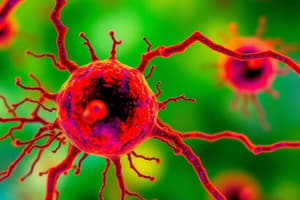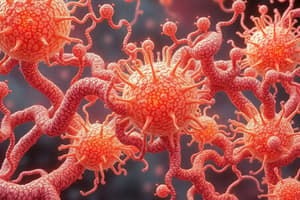Podcast
Questions and Answers
What strategies should students adopt to succeed in Science 2?
What strategies should students adopt to succeed in Science 2?
Engage in active learning, apply concepts to real-world situations, develop time management skills, and seek help when struggling
What are the topics covered in Science 2, particularly the biology subtopic?
What are the topics covered in Science 2, particularly the biology subtopic?
Populations, communities, ecosystems, biogeography, and biodiversity
Why is Science 2 considered a challenging phase for students?
Why is Science 2 considered a challenging phase for students?
The material becomes more specialized and demanding, requiring deeper understanding and engagement
What are the key discoveries in molecular biology?
What are the key discoveries in molecular biology?
Define neurobiology and highlight a key discovery in this field.
Define neurobiology and highlight a key discovery in this field.
What is the study of ecology and what are some key discoveries in this field?
What is the study of ecology and what are some key discoveries in this field?
Study Notes
Science 2
Science 2, or second-year science, is a crucial step in a student's academic journey. It is often a pivotal time when students transition from introductory courses to more specialized and challenging material. In this article, we will delve into the various aspects of Science 2, focusing on the subtopics of biology.
Biology
Biology is an essential subject in Science 2, as it provides students with a broad understanding of the living world and its various concepts, including:
-
Cellular Biology: This topic covers the structure and function of cells, which are the fundamental units of life. It includes an in-depth study of the nucleus, organelles, cell division, and cellular respiration.
-
Molecular Biology: This branch of biology explores the structure and function of molecules that play a crucial role in cellular processes, such as DNA, RNA, and proteins.
-
Genetics: Genetics is the study of heredity and the variation of inherited traits. It covers topics like Mendelian genetics, DNA replication, mutation, gene expression, and genetic engineering.
-
Evolution: This aspect of biology focuses on the study of the changes in species over time, including natural selection, speciation, and the development of new species.
-
Ecology: Ecology is the study of interactions among organisms and their environment. It covers topics like populations, communities, ecosystems, and biogeography.
-
Biodiversity: This topic explores the variety of life on Earth, including the classification of organisms, the factors that contribute to biodiversity, and the importance of conserving endangered species.
Challenges and Strategies
Science 2 can be a challenging phase for students, as the material becomes more specialized and demanding. To succeed in this stage, students should adopt the following strategies:
-
Active Learning: Engage in active learning techniques, such as asking questions, participating in discussions, and collaborating with peers.
-
Practical Applications: Apply the concepts learned in class to real-world situations, such as conducting experiments or analyzing data.
-
Time Management: Develop effective time management skills to ensure that you allocate sufficient time to studying and completing assignments.
-
Ask for Help: Don't hesitate to seek help from teachers, tutors, or classmates when you're struggling with a concept or assignment.
Conclusion
Science 2, particularly the biology subtopic, offers students an opportunity to delve deeper into the world of living organisms and their interactions. By adopting effective learning strategies and overcoming challenges, students can succeed in this crucial stage of their academic journey.
Studying That Suits You
Use AI to generate personalized quizzes and flashcards to suit your learning preferences.
Description
Explore the essential subtopics of biology in Science 2, covering cellular biology, molecular biology, genetics, evolution, ecology, and biodiversity. Learn about the challenges and strategies for success in this crucial phase of academic study.





